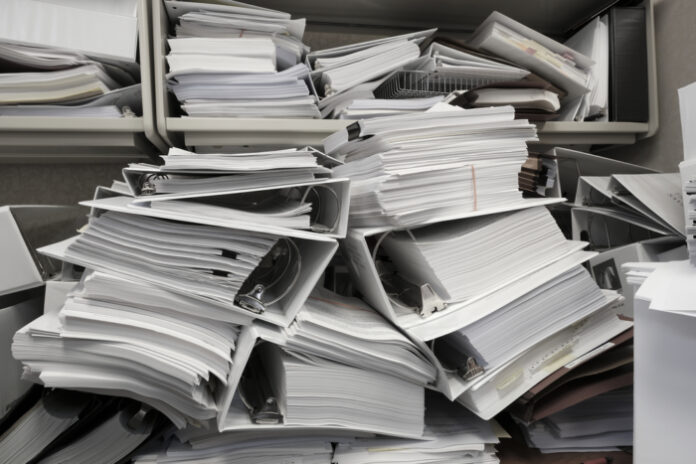By Jim Conroy, CEO of The Neat Company
There comes a point for every business when financial records can’t be kept in your head or in a shoebox. If you’re not a natural organizer, here’s good news: there are now ways to keep your business records in order and at hand easily.
Key Takeaways
- Business records are powerful: They tell you how your business is doing.
- Filing taxes is less stressful if you’ve kept good records.
- Old tricks and new technology can help you master the organization and storage of your business records.
Consider Jody, a whiz at landscaping, but terrible at recordkeeping.
One of Jody’s first jobs was for a contact from the local chamber of commerce. The client had a double-sized lot and wanted to give it an English garden feel. Jody rented a tractor and a tiller, purchased the necessary plants, and hired a day laborer. It was a lucrative job, and the client referred Jody to others.
Unfortunately, Jody misplaced the invoices and receipts for the job. That left Jody unable to compute whether the job was profitable. This led to inaccurate bids for referral clients, who expected the same pricing. Jody wound up carrying a large credit card debt at a high-interest rate. Missing receipts, Jody had underpaid estimated taxes for the business, which led to penalties when tax time came.
Not surprisingly, Jody paid much closer attention to records from then on.
Make Your Strategy
Even a home business is still a business. Its records can’t just be casually tossed into a drawer or crumpled in a glove box. If you plan to grow your business; if you plan to pay the correct amount of taxes and avoid fines and penalties; and if you’re not naturally organized, you need a strategy for organizing and securing your financial records. Even in a world without taxes, any business needs accurate records of what funds have come in and what money has been paid out.
Where To Start
Next, discover what records you need to be able to find and work with. The IRS expects you to keep:
• Gross receipts records showing your business income (e.g., such as cash register tapes or invoices).
• Purchase records.
• Expense records for necessary costs for conducting your business. They should show who was paid, the amount, when, and the item or service bought.
• Travel, transportation, entertainment, and gift expenses records.
• Asset records of when and how you acquired machinery, furniture, or real estate (important for calculating depreciation).
• Employment taxes records, which must be retained for at least four years after filing the 4th quarter of the year.
• Tax returns.
There could be other records such as business registration documents, financial statements, emails, and more. When in doubt, retain and store carefully and systematically.
Building Your System
When securing financial records, your system should prioritize user-friendliness and accessibility. Knowing where your documents are puts you in control of what you’re doing. Your business will be more effective when you can find everything. When you’ve chosen an adequate system, your documents won’t be lost or damaged. A well-designed system puts materials at the tip or tap of your fingers within seconds. Once you’ve established your system, you can rely on its structure as the basis for future work. Regulatory bodies like the IRS require you to demonstrate compliance, which is facilitated by a well-organized system. In case of disputes, accurately maintained and filed records provide crucial support. Whether you’re a solopreneur or you’ve got a handful of employees, the ability to necessary documents alleviates stress and mitigates potential issues.
The particular elements of your system will depend on your comfort, budget, tech skills, and, ultimately, what works specifically for you. You may find that a desk drawer with manila file folders marked clearly and organized alphabetically works for you. A file cabinet may be easier, with drawers designated for tax-related items, financial data and reports, payroll and employment, and banking. Some home businesses are comfortable entering data into a spreadsheet (you can even store photos of your receipts in one). If your business takes you away from your desk a lot, a solution that’s available from everywhere — such as a cloud-based document management system (DMS) — may be just the thing. A DMS would allow you to upload data through a smartphone camera, via email, or directly from your computer. Many can even produce financial reports, giving you an opportunity to assess the state of your business and whether you’re achieving your goals.
Your system should be easily communicated to and used by employees or independent contractors (such as bookkeepers). Everything should go to the same place, whether a file cabinet or cloud storage. The IRS will accept digitally stored records should you be audited. And whatever you do, don’t mix your personal and business matters. (Don’t forget there are tax advantages to a dedicated workspace in your home for a home business.)
Don’t Lose Your Data
Paper records can be damaged or lost by spilled coffee, wayward pets, and children, or floods or fire. Even digital options can succumb to hardware failure, cyberattacks, or accidental deletion. Back up to a thumb drive, a cloud storage service, or a DMS where your data are stored securely in the cloud. Also consider security when securing financial records, especially if you have personal data about people who work for you. At least put a lock on your desk drawer or file cabinet. Consider a fireproof safe. Password-protect your spreadsheet and computer. Or use a DMS that encrypts its data during transmission and on its servers.
Organize Yourself
None of this works if you don’t make organizing and securing your financial records a priority. Commit to storing your financial records regularly. Ideally, you would file them when you’re finished, but at least take five minutes at the end of the day or a little longer at the end of the week. You can also remove records you’ll no longer need. The IRS expects that you’ll keep tax-related records for at least three years, but can also be 7 years, 6 years, or indefinitely based on circumstances. The IRS can audit your business’s financial records up to seven years back. A document-retention strategy that identifies when you can remove (by deletion or shredding) is a good idea.
Your Record Future
It’s easy to lose records, and losing the wrong records can kill your business. Effectively organizing and securing financial records can save your business. With good records, you’ll always have insight into how well you’re doing. That will help you make good decisions that help your business to grow. Even better, you can be calm knowing you’re organized. And maybe you can even spend time doing something enjoyable that’s not business paperwork.
Find a Home-Based Business to Start-Up >>> Hundreds of Business Listings.















































